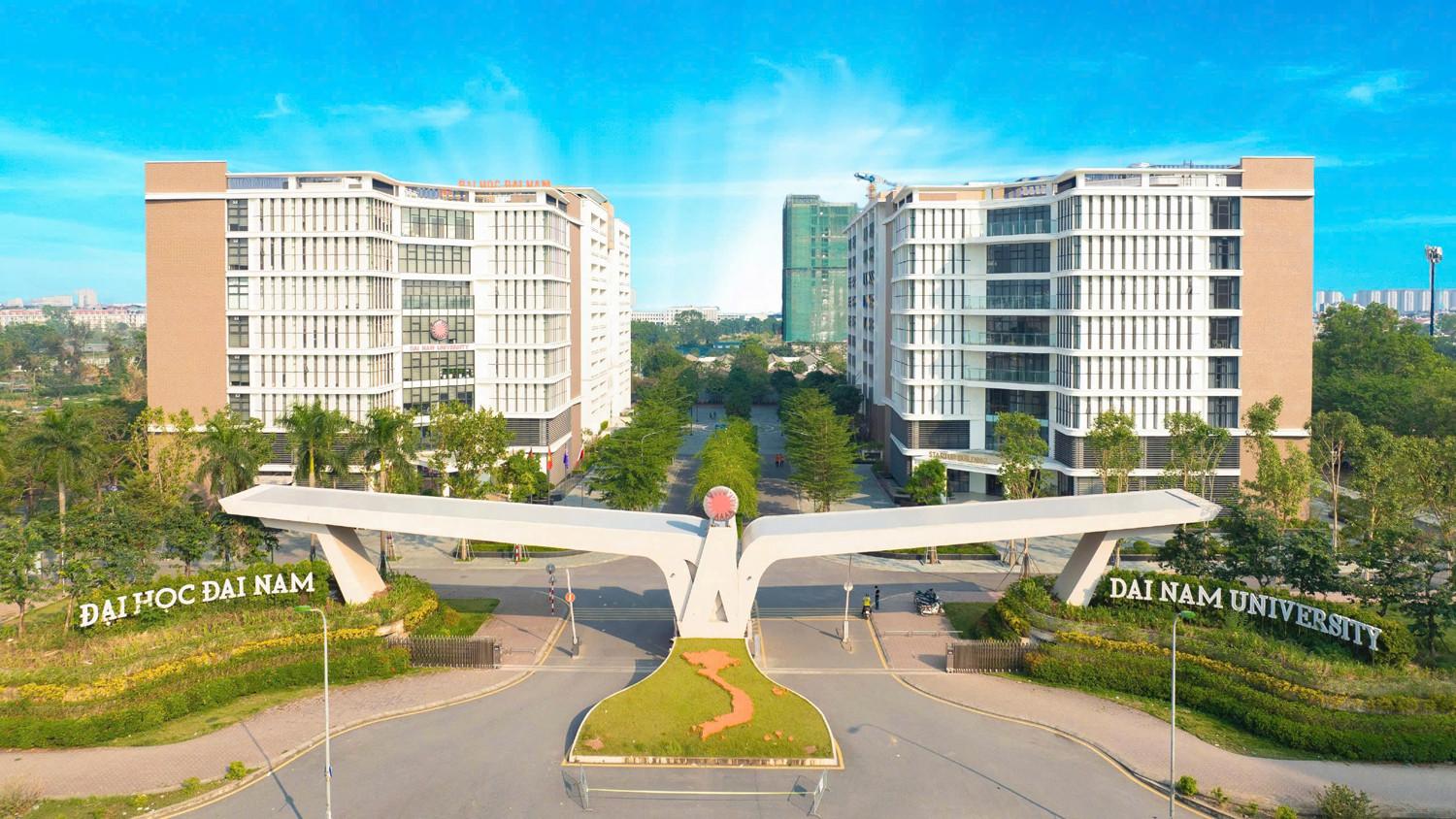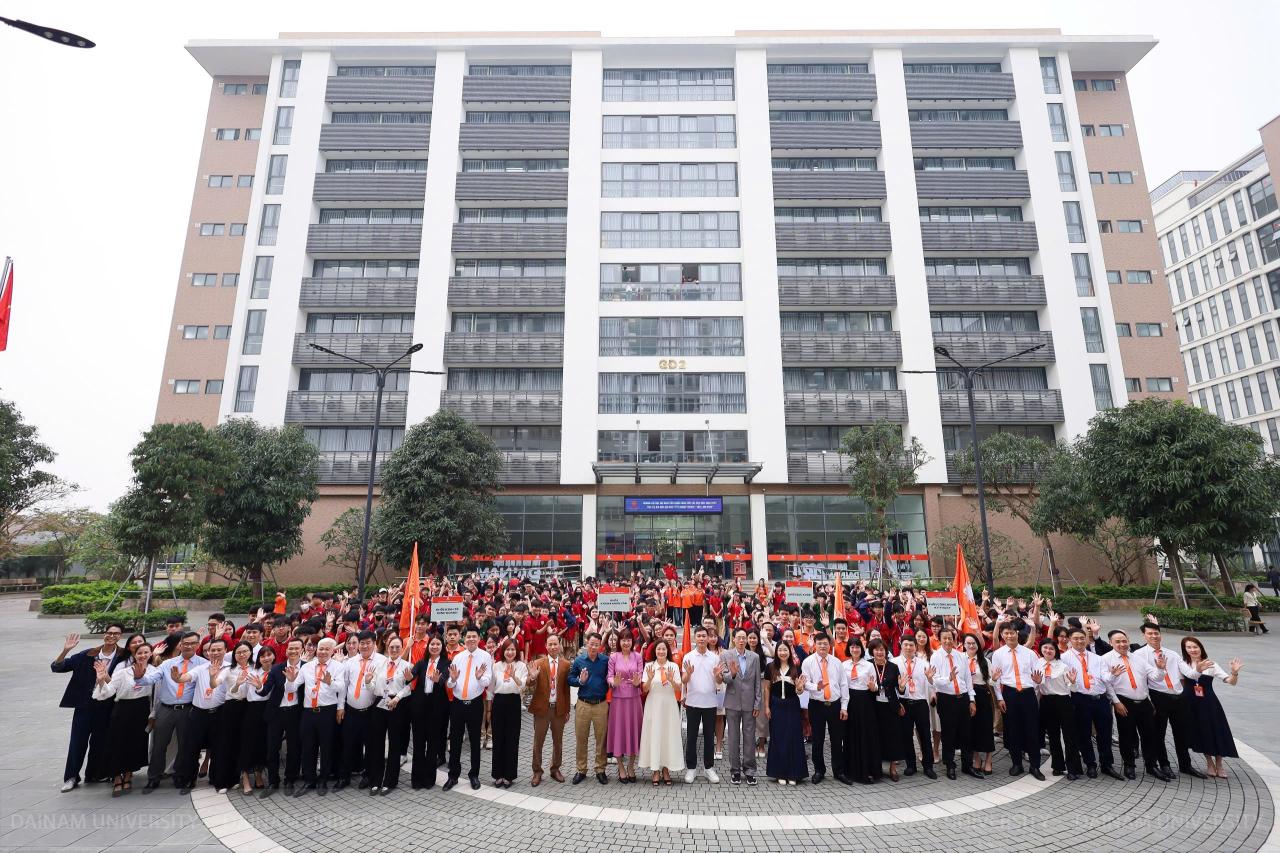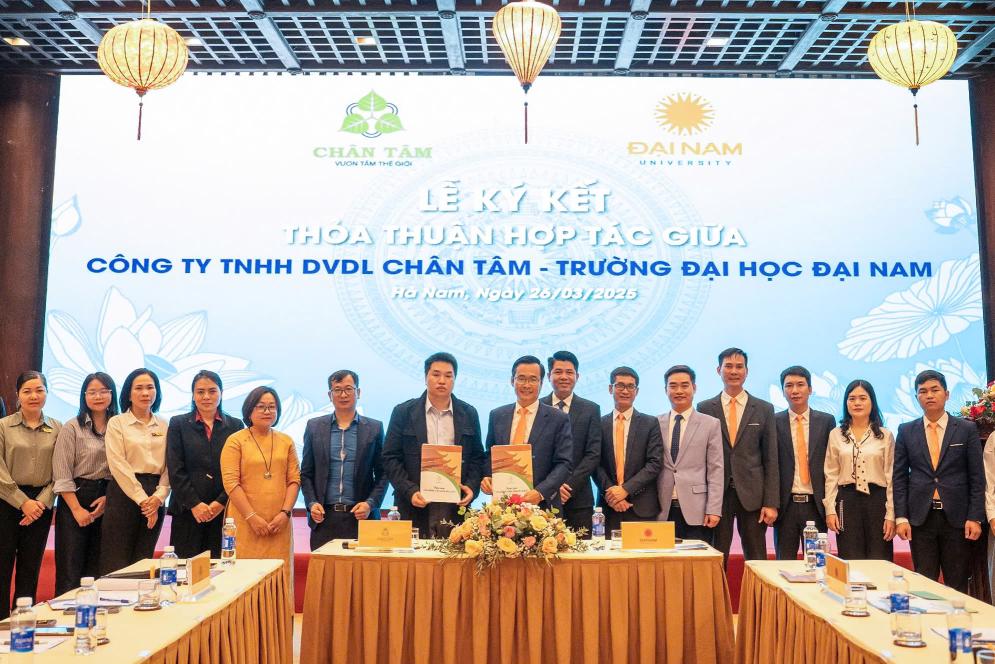Banking and Finance - A field of study that never cools down
Posted date 13/04/2018
2.183 view

Overcoming the "frozen" period, banking and finance is still one of the fastest growing industries in Vietnam in recent years. Along with the signs of recovery of the general economy, Vietnam's accession to AEC, TPP... makes the banking and finance sector need higher quality human resources than ever and predicts that the career door for human resources in the Finance - Banking sector will be even wider open. Dai Nam University, with its strength in training in the fields of business, management as well as banking and finance (TCNH), has become a solid career choice for many young people in the face of the integration trend. 2017 is considered a year of miracles for the Vietnamese economy. Spectacular, exceeding plans, records... are the phrases used to describe the economic picture of 2017: 13 socio-economic development targets assigned by the National Assembly all met and exceeded the plan; Economic growth reached 6.81%, exceeding the target of 6.7% assigned by the National Assembly - the highest GDP growth in the past 6 years; Inflation
MSc. Nguyen Thi Thu Trang
Lecturer, Faculty of Finance and Banking - Dai Nam University
Overcoming the “frozen” period, banking and finance is still one of the fastest growing industries in Vietnam in recent years. Along with the signs of recovery of the general economy, Vietnam’s accession to AEC, TPP… makes the banking and finance sector need higher quality human resources than ever and predicts that the career doors for human resources in the Finance - Banking sector will be even wider open.
Dai Nam University with its strength in training in the fields of business, management as well as finance and banking (TCNH ) has become a solid career choice for many young people in the face of integration trends.
1. Career opportunities are always open for students majoring in banking and finance.
2017 is considered a miracle year for the Vietnamese economy. Spectacular, exceeding the plan, record... are the phrases used to describe the economic picture of 2017 : 13 socio-economic development targets assigned by the National Assembly were all achieved and exceeded the plan; economic growth reached 6.81%, exceeding the target of 6.7% assigned by the National Assembly - the highest GDP growth in the past 6 years; Inflation reached 3.53%, lower than the plan of 4%... The improvement of the investment and business environment has created more favorable conditions for 126,859 newly established enterprises, entering the market and participating in the production and business process. According to data from the General Statistics Office (Ministry of Planning and Investment), in 2017, the country had 126,859 newly established enterprises, with a total registered capital of VND 1,295.9 trillion, an increase of 15.2% in the number of enterprises and 45.4% in registered capital compared to 2016. The number of newly established enterprises in 2017 is considered the highest ever, surpassing the record number of 110,000 enterprises in 2016.
Along with the recovery and growth of the Vietnamese economy in general, 2017 is also considered a successful year for the securities, insurance and especially the banking sectors.
According to the report of the National Financial Supervisory Commission, credit growth in 2017 reached about 19%, equivalent to 2016. This has greatly supported the growth of the banking industry's profits, reaching 40% of the entire industry. Confidence in the banking system has improved, and bank ratings have changed in a positive direction. Vietnam's rating outlook has been changed from "negative" to "stable" and now to "positive stable" outlook. Bad debt has decreased rapidly. These are significant improvements due to the improved financial foundation, including total assets, equity and profitability. The profitability index has nearly doubled to 11%, with some banks reaching 14-15%, reaching the average level of the Southeast Asian region. Besides, the restructuring of the banking system has achieved initial results and created certain confidence, creating brighter prospects in 2018.
In the context of a rapidly recovering economy, along with the strong growth of the banking system, the financial market currently accounts for about 170% of the country's GDP. This shows that this is one of the fields with high demand for human resources in the current period.
The integration trend is also a strong push for the banking industry in our country. Agreements on free movement of investment capital and Vietnam's dynamic, low-risk economic environment attract more and more international banks to invest such as HSBC, CitiBank, Hong Leong Bank, ANZ, Standard Chartered... The rapid development of domestic and foreign banks in recent years has created thousands of job opportunities for many young people, predicting that the career door for human resources in the banking industry will be even wider open.
With the recovery of the economy, the banking sector is also beginning to expand its business activities. Banking experts believe that although the number of employees in the banking sector has increased rapidly in the past year, with the current development of the banking sector, the demand for human resources is still very large. This is especially meaningful when the number of employees working in the banking sector only accounts for a very small proportion of the total workforce of the entire economy.
The assessment of experts is quite close to the actual market developments. Because the results of the survey on business trends of the banking industry announced by the Forecasting and Statistics Department, State Bank of Vietnam at the beginning of the year also showed that the demand for human resource recruitment of banks in 2018 is very large. In the fourth quarter of 2017, 52.1% of credit institutions (CIs) said they had recruited more workers, but 25.3% of CIs still said that the labor shortage situation has not improved, especially personnel for current job needs. It is expected that in the new year 2018, CIs will continue to recruit more workers to serve the work with 52.1% of CIs planning to continue recruiting more workers in the first quarter of 2018 and 68.7% of CIs planning to increase the number of workers in the whole year of 2018.
Also based on employer feedback in a survey, jobstreet.com has listed the 10 industries with the highest recruitment demand in Vietnam in the 2018 labor market forecast, showing that TCNH is still a hot industry in the top 10 industries with the highest recruitment demand in Vietnam.
According to the report of the National Financial Supervisory Commission, credit growth in 2017 reached about 19%, equivalent to 2016. This has greatly supported the growth of the banking industry's profits, reaching 40% of the entire industry. Confidence in the banking system has improved, and bank ratings have changed in a positive direction. Vietnam's rating outlook has been changed from "negative" to "stable" and now to "positive stable" outlook. Bad debt has decreased rapidly. These are significant improvements due to the improved financial foundation, including total assets, equity and profitability. The profitability index has nearly doubled to 11%, with some banks reaching 14-15%, reaching the average level of the Southeast Asian region. Besides, the restructuring of the banking system has achieved initial results and created certain confidence, creating brighter prospects in 2018.
In the context of a rapidly recovering economy, along with the strong growth of the banking system, the financial market currently accounts for about 170% of the country's GDP. This shows that this is one of the fields with high demand for human resources in the current period.
The integration trend is also a strong push for the banking industry in our country. Agreements on free movement of investment capital and Vietnam's dynamic, low-risk economic environment attract more and more international banks to invest such as HSBC, CitiBank, Hong Leong Bank, ANZ, Standard Chartered... The rapid development of domestic and foreign banks in recent years has created thousands of job opportunities for many young people, predicting that the career door for human resources in the banking industry will be even wider open.
With the recovery of the economy, the banking sector is also beginning to expand its business activities. Banking experts believe that although the number of employees in the banking sector has increased rapidly in the past year, with the current development of the banking sector, the demand for human resources is still very large. This is especially meaningful when the number of employees working in the banking sector only accounts for a very small proportion of the total workforce of the entire economy.
The assessment of experts is quite close to the actual market developments. Because the results of the survey on business trends of the banking industry announced by the Forecasting and Statistics Department, State Bank of Vietnam at the beginning of the year also showed that the demand for human resource recruitment of banks in 2018 is very large. In the fourth quarter of 2017, 52.1% of credit institutions (CIs) said they had recruited more workers, but 25.3% of CIs still said that the labor shortage situation has not improved, especially personnel for current job needs. It is expected that in the new year 2018, CIs will continue to recruit more workers to serve the work with 52.1% of CIs planning to continue recruiting more workers in the first quarter of 2018 and 68.7% of CIs planning to increase the number of workers in the whole year of 2018.
Also based on employer feedback in a survey, jobstreet.com has listed the 10 industries with the highest recruitment demand in Vietnam in the 2018 labor market forecast, showing that TCNH is still a hot industry in the top 10 industries with the highest recruitment demand in Vietnam.
Overcoming the "frozen" period, banking and finance is still one of the fastest growing industries in Vietnam in recent years. According to data from the Center for Human Resource Demand Forecasting, in the period of 2016-2025, major cities such as Hanoi and Ho Chi Minh City alone will need nearly 200,000 more jobs in the fields of finance, banking, credit, insurance, securities, etc., promising many job opportunities with attractive benefits.
Thus, it can be said that the IT industry will still be "thirsty for human resources until 2025".
2. What career do you get after studying finance and banking? Where do you work after graduation?
Studying finance and banking to do what job?
The stock market is increasingly vibrant, real estate develops according to the roadmap, which leads to the prosperity of the banking and finance sector. The circulation of money is always operated like blood vessels in the body because it has the task of ensuring the operation of the entire system, whether the economy is developing or in crisis, the job prospects of the industry are never limited. A series of branches and transaction offices across the country are expanding, promising to bring many career opportunities and promotions for those who are capable and well-trained in the banking and finance sector. However, there are still many candidates who understand that studying Banking and Finance after graduation only work in banking . In fact, after graduating, students majoring in Banking and Finance can take on important job positions such as:
- Credit specialist and bank credit appraisal, Transaction officer, Treasury officer, Accounting specialist, internal auditor of commercial bank, International payment department specialist, Foreign exchange trader...
- Financial planning specialist, Asset and corporate capital management specialist, Corporate accounting specialist, Corporate financial analysis specialist...
- Property valuation specialist
- Specialist in business mergers and acquisitions
- Investment consultant, securities broker, securities underwriter
- Investment fund specialist
- Insurance sales specialist...
Where to work after studying banking and finance?
With the above attractive career positions, graduates of TCNH can apply for positions in various agencies such as:
- Commercial banks; State banks; People's credit funds; Social policy banks; Development banks
- Finance companies, financial leasing companies
- Securities companies, Investment funds
- Valuation and valuation companies
- Insurance companies
- Tax and customs department
- All other types of businesses including large corporations, joint stock companies, partnerships, private enterprises, limited liability companies...
Thus, job options for graduates of the Finance and Banking major are very diverse and the strong trend of international integration has opened up many significant prospects for this field. In that context, foreign languages have become a mandatory factor for Finance and Banking students to keep up with the general development in the country and the world. This context has created a "thirst" for quality human resources with full integration skills, information technology, communication, teamwork, presentation and debate skills... In which, English and soft skills are considered a vital requirement.
Dai Nam University is a university that has built a reputation nationwide, especially in training in the field of Finance and Banking. The difference of students studying Finance and Banking at Dai Nam University is that they "learn while doing" - theory always goes hand in hand with practice, they learn professional skills such as securities analysis and investment skills; project appraisal skills, cash flow planning skills; trading skills... In addition, third and fourth year students have had practical internship experiences at securities companies, banks, and insurance companies in the form of apprenticeships and internships with direct guidance from bank staff or securities/insurance companies. That helps them initially exploit their own abilities and orient their careers appropriately after graduation.
In addition, Dai Nam University focuses on training foreign languages and soft skills for students from the first year. These important factors have been specified through the TOEIC output standards and soft skills courses: communication, presentation, teamwork, interviewing, etc. Therefore, over the past 10 years of establishing the Banking and Finance Faculty, generations of Banking and Finance students of Dai Nam University have always been a quality human resource sought after by banking recruiters. Up to now, thousands of Banking and Finance students of Dai Nam University are working in all types of enterprises nationwide and are highly appreciated for their quality.
----------------------
Thus, it can be said that the IT industry will still be "thirsty for human resources until 2025".
2. What career do you get after studying finance and banking? Where do you work after graduation?
Studying finance and banking to do what job?
The stock market is increasingly vibrant, real estate develops according to the roadmap, which leads to the prosperity of the banking and finance sector. The circulation of money is always operated like blood vessels in the body because it has the task of ensuring the operation of the entire system, whether the economy is developing or in crisis, the job prospects of the industry are never limited. A series of branches and transaction offices across the country are expanding, promising to bring many career opportunities and promotions for those who are capable and well-trained in the banking and finance sector. However, there are still many candidates who understand that studying Banking and Finance after graduation only work in banking . In fact, after graduating, students majoring in Banking and Finance can take on important job positions such as:
- Credit specialist and bank credit appraisal, Transaction officer, Treasury officer, Accounting specialist, internal auditor of commercial bank, International payment department specialist, Foreign exchange trader...
- Financial planning specialist, Asset and corporate capital management specialist, Corporate accounting specialist, Corporate financial analysis specialist...
- Property valuation specialist
- Specialist in business mergers and acquisitions
- Investment consultant, securities broker, securities underwriter
- Investment fund specialist
- Insurance sales specialist...
Where to work after studying banking and finance?
With the above attractive career positions, graduates of TCNH can apply for positions in various agencies such as:
- Commercial banks; State banks; People's credit funds; Social policy banks; Development banks
- Finance companies, financial leasing companies
- Securities companies, Investment funds
- Valuation and valuation companies
- Insurance companies
- Tax and customs department
- All other types of businesses including large corporations, joint stock companies, partnerships, private enterprises, limited liability companies...
Thus, job options for graduates of the Finance and Banking major are very diverse and the strong trend of international integration has opened up many significant prospects for this field. In that context, foreign languages have become a mandatory factor for Finance and Banking students to keep up with the general development in the country and the world. This context has created a "thirst" for quality human resources with full integration skills, information technology, communication, teamwork, presentation and debate skills... In which, English and soft skills are considered a vital requirement.
Dai Nam University is a university that has built a reputation nationwide, especially in training in the field of Finance and Banking. The difference of students studying Finance and Banking at Dai Nam University is that they "learn while doing" - theory always goes hand in hand with practice, they learn professional skills such as securities analysis and investment skills; project appraisal skills, cash flow planning skills; trading skills... In addition, third and fourth year students have had practical internship experiences at securities companies, banks, and insurance companies in the form of apprenticeships and internships with direct guidance from bank staff or securities/insurance companies. That helps them initially exploit their own abilities and orient their careers appropriately after graduation.
In addition, Dai Nam University focuses on training foreign languages and soft skills for students from the first year. These important factors have been specified through the TOEIC output standards and soft skills courses: communication, presentation, teamwork, interviewing, etc. Therefore, over the past 10 years of establishing the Banking and Finance Faculty, generations of Banking and Finance students of Dai Nam University have always been a quality human resource sought after by banking recruiters. Up to now, thousands of Banking and Finance students of Dai Nam University are working in all types of enterprises nationwide and are highly appreciated for their quality.
----------------------
Latest article
View all Posts
Related articles
See all related Articles
.png)









